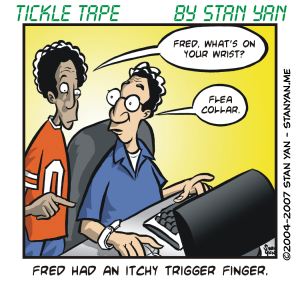Your mind has limits. You can only attend to and process a limited amount of information. Psychologists view the mind as analogous to a computer. Long-term memory is similar to a hard disk in that an almost unlimited amount of information is stored permanently, even when the computer is turned off. Your attention, or conscious thought, in contrast, is similar to computer RAM.
The amount of attention you can devote to a particular task is restricted. You can only attend to and process limited amounts of information, and when you move beyond the limit, the information is not processed. In this way, attention and “short-term” memory is similar to RAM in a computer. You can hold only a small amount of information in your mind for only a short time. Your mind is also limited in terms of “processing capacity.”
Like a CPU in a computer, not only is the amount of information you can process limited, but also the speed at which you can process, analyze, and understand information. The mind may be analogous to a computer, but it isn’t exactly like a computer. You cannot do a “computer upgrade.” You can’t simply increase the mind’s processing power by merely putting in additional RAM or replacing the CPU with a faster processor. You are stuck with what you have, so you must make the most of it. That said, however, there’s still a lot you can do to squeeze every bit of power out of your mind. You can expand your mind beyond its natural limits.
One way to increase the amount of information you can process as a trader is to “overlearn” some of the common tasks you do while trading. It is similar to how people learn to drive a car. At first, one must focus attention on each driving task separately in a deliberate, focused manner. But, over time, one can monitor speed, look for road hazards, and engage in several tasks automatically, and still have plenty of attention to talk with a friend or insert a CD into the car stereo.
You may have noticed that trading tasks can be “over-learned” in much the same way. For example, you probably have noticed that over time, you can identify signals that precede a pivot point almost automatically. With practice, a lot of steps that you once had to perform deliberately and methodically can now be completed will little effort. Many times, “intuitive” decisions merely seem as if they are a “gut instinct,” but may in fact be based on a several valid and reliable inputs and signals that were processed automatically.
A second way to increase processing power is to free up mental energy that is used up by other psychological processes. For example, handling stress, and mulling over interpersonal conflicts uses up precious psychological energy. This valuable energy is better spent on monitoring trades. By spending leisure time resolving interpersonal conflicts or effectively coping with daily hassles, you will have more psychological energy to devote to trading after the markets open.
Rest and relaxation are also important. When you are tired, you can’t devote very much energy to planning your trades or monitoring their progress. You’ll be more likely to act impulsively, entering a trade too early or too late because you didn’t have the energy to patiently wait to make a prudent trading decision. So make sure you get extra sleep. Take naps during the day, if you have to, and ensure that you are alert when it counts during the trading day.
Don’t forget that the mind has limits. You can only work with what you have. If you take the proper steps, however, you can free up some of your limited psychological resources. By over-learning common trading tasks, you can expand your attention. And by getting adequate rest and resolving interpersonal conflicts, you can further free up psychological energy that is wasted on tasks that don’t involve trading. By taking concerted measures to free up energy, you can expand the limits of your mind, and trade more effectively.


